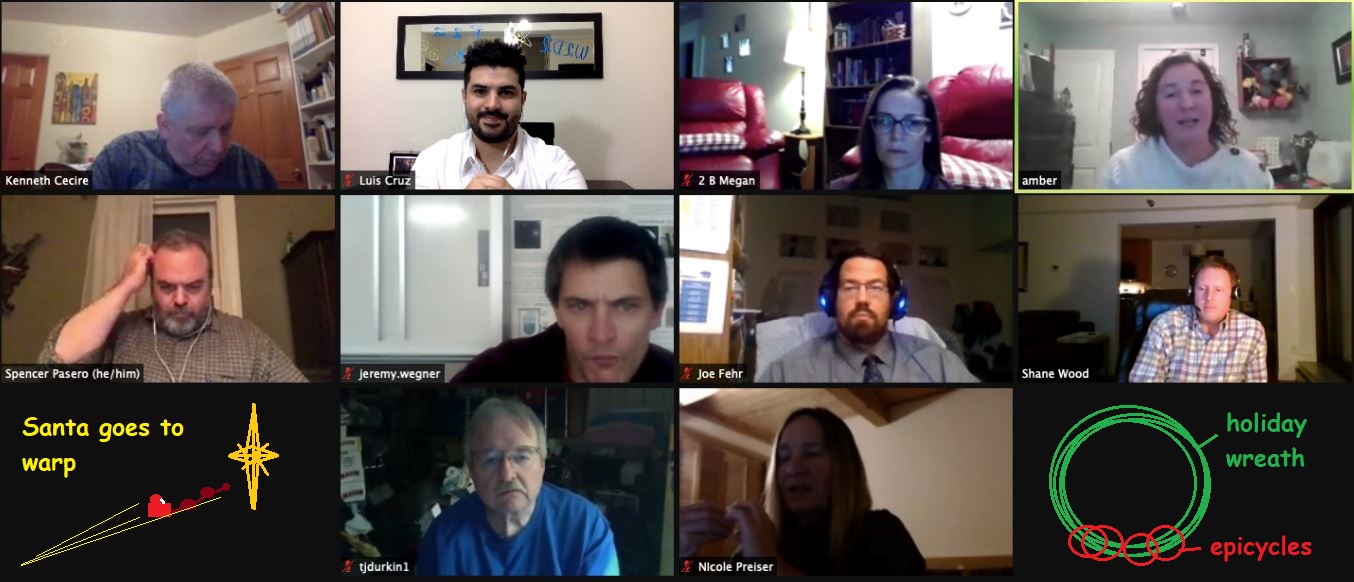Friday Flyer - December 18, 2020

Spotlight on the Year
We do not need to go over the difficulties of the year equal to 22(5)(101). Let's talk about some highlights of the progress we made.
As International Masterclasses came to a halt, some in QuarkNet managed to hold them anyway; fellow Jeremy Wegner held a virtual masterclass with his students before virtual was ubiquitous. Twenty QuarkNet schools joined the all-virtual Big Analysis of Muons in CMS in April and May, and schools from around the world joined in. BAMC and subsequent masterclass efforts might have foundered if not for the work of the LHC-Neutrino fellows who responded to the crisis by increasing their activity and their meetings.
Then summer came. As it became apparent that it would be just about impossible to have our "normal" summer workshops, some centers very reasonably deferred for a year, but others held virtual workshops. The intrepid members of the Notre Dame center managed to not only create a summer class in particle physics for high school students, but also managed to hold an in-person teacher workshop outdoors with masks and social distancing. The Lawrence Berkeley National Laboratory center also held online classes for students and pioneered the Big Analysis of Muons in ATLAS. Fellows retooled data workshops and e-Lab workshops to be doable online; the Teaching and Learning fellows converted Data Camp into two (!) online Coding Camps that got raves. Deborah et al. adapted much of the Data Activities Portfolio to online learning as well.
International collaboration continued and even expanded. QuarkNet has deepened its collaboration on cosmic ray studies with counterparts in Japan, and fellow Nate Unterman just finished remotely assisting colleagues in Argentina with their own eclipse-related cosmic ray project. Five QuarkNet teachers and one staff member joined colleagues from many countries on a project to curate the Resources Database (RDB) that will be available in the new IPPOG website. UK teacher Kevin Mosedale explains: I love browsing in bookshops and being an RDB curator is similar, except that I get to spend time looking through particle physics resources. Unlike in a bookshop, however, I can play a part in making sure that the items on the virtual shelves are interesting and useful for other people!
QuarkNet teachers and their students took advantage of special opportunities as well. In spring, we had the QuarkNet Webinar Series with six presentations that kept physics interesting after a sudden shift to online schooling. The summer saw an online course taught by Fermilab physicist Allison Reinsvold-Hall, The Standard Model and Beyond, in the new Summer Session for Teachers. In late summer, we started QuarkNet Educational Discussions, which went through the fall and will go on in the coming year. World Wide Data Day went online and was a success.
This year has been tough. In adapting, we've all managed to grow.

Note: Holiday enhancements added by elves working in our North Pole Data Workshop..

News from QuarkNet Central
Registration for International Masterclasses continues through January 8. Read and find registration links in the latest IMC Circular. Masterclass leaders, please sign up as soon as you can, as masterclass videoconferences start February 11 for CERN and February 16 for Fermilab. Questions? Contact Ken or Uta.
QuarkNet Educational Discussions (QED) have concluded for 2020, but stay tuned, as these discussions will pick up again in January!
Beamline for Schools 2021 is on! Get basic information and a registration link in the announcement, and find more resources at the Useful Documents page.
In response to an idea from Brookhaven-Stony Brook teacher Gillian Winter, we've recently introduced a new data activity, Particle Transformations. Students examine various particle decays to explore the rules that govern them; along the way, students also learn to read simple Feynman diagrams. This one is a must for IB Physics and useful for teachers and students alike in making sense of how fundamental particles behave.

Physics Experiment Roundup
The Large Hadron Collider may still be in its second long shutdown (LS2), but that does not keep it out of the news. CERN Bulletin files this LS2 report, and symmetry explains matter-antimatter weirdness from LHCb. Fermilab breaks new ground, as recorded in Fermilab News, with the first measurement of single-proton interactions at MicroBooNE and—get this—advances in quantum teleportation.
But wait! There's more! APS Physics has an article on detecting possible low-mass dark matter candidates, and Interactions tells how Oak Ridge National Laboratory has made a major advance in precision neutrino studies.

Resources
Speaking of dark matter, there are still ideas about modifying gravitational theory to explain it away. Phys.org enlightens by explaining some constraints on alternative gravity theories. Staying with theory, symmetry offers how "impossible" black holes discovered by LIGO-Virgo could be explained at the particle scale.
We can round out our resources for the year with Physics Today on books that stood out and APS Physics on physics highlights.

Just for Fun
Holiday specials! Phys.org gives us a rather off-beat take on the physics of Santa Claus. And we close out with holiday physics experiments, courtesy of Physics Girl.
The Friday Flyer is taking a break over the holidays. We'll see you again on January 8, 2021. Until then, we wish you health, happiness, and cheer in all your celebrations.
QuarkNet Staff:
Mark Adams: adams@fnal.gov
Ken Cecire: kcecire@nd.edu
Spencer Pasero: spasero@fnal.gov
Shane Wood: swood5@nd.edu
